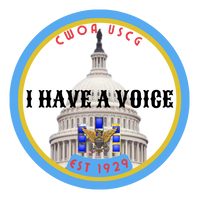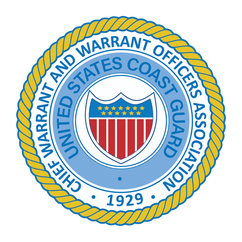CWOA Legislative Corps Expectations

PURPOSE
CWOA's Legislative goal is to be the Voice for America's Coast Guard on Capitol Hill. This is done through Legislative Advocacy efforts on Capitol Hill and by educating Congress and the nation on issues pertaining to our Coast Guard and National Defense as well as our Veterans. We continuously keep Members informed of what's happening and provide them with resources they need to be knowledgeable of the issues.
NATIONAL LEGISLATIVE OBJECTIVES
Formed from our National Resolutions and voted on at every CWOA Annual Meeting .
LEGISLATIVE DEPARTMENT CHALLENGES
CWOA's Legislative goal is to be the Voice for America's Coast Guard on Capitol Hill. This is done through Legislative Advocacy efforts on Capitol Hill and by educating Congress and the nation on issues pertaining to our Coast Guard and National Defense as well as our Veterans. We continuously keep Members informed of what's happening and provide them with resources they need to be knowledgeable of the issues.
NATIONAL LEGISLATIVE OBJECTIVES
Formed from our National Resolutions and voted on at every CWOA Annual Meeting .
LEGISLATIVE DEPARTMENT CHALLENGES
- Increase presence on and off Capitol Hill (through DC and CWOA Legislative Corps) by maximizing amount of in-person meetings with Members of Congress and key staff and utilize meetings as a means to inform, educate and develop relationships.
- Increase use of communication tools of Legislative work and advocacy on Capitol Hill through E-newsletters (Monthly Legislative Updates), Legislative Alerts, LinkedIn and Facebook posts, up to date CWOA Website, and an aggressive letter writing campaign to elected officials.
- Improve coordination with other Coast Guard allies and partners: Coast Guard- Office of Legislative Affairs (OLA), TMC, Fleet Reserve Association, USCG Chief Petty Officers Association, and many others.
Congressional Meeting Requirements and Expectations
This is a Federal outreach program, so we need our Liaisons to note the difference between Federal Congress versus State Legislature. Liaisons should stick to Federal issues of concern to CWOA (CWOA’s National Resolutions and Legislative Objectives) that benefit all members of the Coast Guard and Veteran communities (no State or Local issues please).
—We are asking our Liaisons to meet with their Members of Congress at least twice a year (in their States ONLY, not in DC), preferably once in the late spring and once in the late summer/early fall. We ask for at least one meeting with each of your Senators, and if possible, one meeting with your Representative.
This is a Federal outreach program, so we need our Liaisons to note the difference between Federal Congress versus State Legislature. Liaisons should stick to Federal issues of concern to CWOA (CWOA’s National Resolutions and Legislative Objectives) that benefit all members of the Coast Guard and Veteran communities (no State or Local issues please).
—We are asking our Liaisons to meet with their Members of Congress at least twice a year (in their States ONLY, not in DC), preferably once in the late spring and once in the late summer/early fall. We ask for at least one meeting with each of your Senators, and if possible, one meeting with your Representative.
- —You must be a permanent resident of the State you have requested to liaison with, otherwise your Senator/Representative will not accept meetings with you and you would be acting as a ‘lobbyist’ rather than concerned constituent. As constituents, you are not required to register as a lobbyist, thus you are exempt from any Lobbying Disclosure rules. Basic rule of thumb is you can only meet with the members who are on the ballot wherever you vote.
CONGRESSIONAL TIMELINE FOR AUTHORIZATION & APPROPRIATION BILLS
(In an ideal Congressional and Budget World)
(In an ideal Congressional and Budget World)
- POTUS: Introduces President’s Budget (PB) request to Congress (Typically late-January/early-February)
- HASC, SASC, HAC-D, SAC-D, HAC-MILCON/VA, SAC-MILCON/VA, HVA, & SVA hold MULTIPLE hearings (Spring)
- HASC: Introduces “Intro” version of NDAA, exact language of PB. (late-March/early-April)
- HASC: Subcommittee Markups (late-April/early-May)
- SASC: Introduces “Intro” version of NDAA, exact language of PB. (late-April/early-May)
- HAC-D: Introduces “Intro” version of Defense Appropriations (late-April)
- HAC-MILCON/VA: Introduces “Intro” version of MILCON/VA Appropriations (late-April)
- Markup (mid-May)
- HAC-D & HAC-MILCON/VA: Markups (mid-May)
- SASC: Subcommittee Markups (mid-May), CLOSED TO PUBLIC
- HASC: House Floor Vote on NDAA with amendment consideration (mid/late-May)
- SASC: Full Committee Markup (late-May), CLOSED TO PUBLIC
- SASC: Senate Floor Vote on NDAA with amendment consideration (late-May/ early-June)
- SAC-D: Introduces “Intro” version of Defense Appropriations (late-May/early-June),
- SAC-MILCON/VA: Introduces “Intro” version of MILCON/VA Appropriations (early-June)
- SAC-D & SAC-MILCON/VA --- Markups (mid-June), CLOSED TO PUBLIC
- House Floor Vote on Defense & MILCON/VA Appropriations (mid/late July)
- Senate Floor Vote on Defense & MILCON/VA Appropriations (mid/late July)
- House & Senate Conference on NDAA, Defense Appropriations and MILCON/VA Appropriations (mid-late Fall/Winter)
- House and Senate Vote and Pass Conferenced Versions of NDAA and All Appropriations, to POTUS for Public Law (ALL CONFERENCE NEGOTIATIONS ARE CLOSED HEARINGS)
NOTES ON TIMELINE
Ideally authorization & appropriations bills should be done by late-June/early-August, but typically Conferences on bills after each chamber has voted on them & Final passage in both chambers & signage into law happen in the fall or winter.
Any authorizing language for Veterans Affairs programs is put into the MILCON/VA Appropriations. Defense is the only area where a separate authorization is needed (sometimes if it related to Defense, a Veteran program can be included in the NDAA as an amendment)
ABBREVIATIONS ON TIMELINE
House Armed Services Committee (HASC)
Senate Armed Services Committee (SASC)
House Appropriations Committee, Subcommittee on Defense (HAC-D)
Senate Appropriations Committee, Subcommittee on Defense (SAC-D)
House Appropriations Committee, Subcommittee on Military Construction &Veterans Affairs (HAC-MILCON/VA)
Senate Appropriations Committee, Subcommittee on Military Construction & Veterans Affairs (SAC-MILCON/VA)
House Veterans Affairs Committee (HVAC)
Senate Veterans Affairs Committee (SVAC)
TIMING IS EVERYTHING
The best time to meet with your Senators and Representative is when Congress is in recess and they are in their State/District offices.
The best time to meet with your Senators and Representative is when Congress is in recess and they are in their State/District offices.
State/District Congressional Staff
—Know Who to Talk to: A typical office in the State/District has a State/District Director, Scheduler, Caseworker(s), Regional Affairs Representative(s) and Staff Assistants (front office receptionists). Directors and Regional Affairs Representatives/ Liaisons are the target audience.
—Know What They Do: State/District Directors (sometimes the Chief of Staff) are in charge of all operations within the State/District while the Senator/Member is in DC. Regional Affairs Representatives/ Liaisons are the ‘folks in the field’ listening to local community leaders, State government and you, the concerned constituent who then relays the information/concerns to the Director or to the DC office (thus strengthening Legislative Director efforts in DC).
—Know Who to Talk to: A typical office in the State/District has a State/District Director, Scheduler, Caseworker(s), Regional Affairs Representative(s) and Staff Assistants (front office receptionists). Directors and Regional Affairs Representatives/ Liaisons are the target audience.
—Know What They Do: State/District Directors (sometimes the Chief of Staff) are in charge of all operations within the State/District while the Senator/Member is in DC. Regional Affairs Representatives/ Liaisons are the ‘folks in the field’ listening to local community leaders, State government and you, the concerned constituent who then relays the information/concerns to the Director or to the DC office (thus strengthening Legislative Director efforts in DC).
Topics to Discuss
—Tell our Story: Tell them first who you are, your background, and who you are representing, CWOA, and what our mission is and how we are one of the largest Advocacy associations for the U.S. Coast Guard, promoting and helping the needs of Active Duty, Reserve and Veteran Coasties, with both equipment needs of our current Coast Guard and Coasties AND the personal care needs of our Coasties and Veterans.
Know What to Talk About: Don’t come in with a laundry list of the things CWOA is concerned with/wants. Pick and choose 1-2 topics from the CWOA Legislative Objectives card (mix it up, one equipment need and one veteran/personnel issue, etc.). Feel free to elaborate on issues you are following/familiar with.
—Tell our Story: Tell them first who you are, your background, and who you are representing, CWOA, and what our mission is and how we are one of the largest Advocacy associations for the U.S. Coast Guard, promoting and helping the needs of Active Duty, Reserve and Veteran Coasties, with both equipment needs of our current Coast Guard and Coasties AND the personal care needs of our Coasties and Veterans.
Know What to Talk About: Don’t come in with a laundry list of the things CWOA is concerned with/wants. Pick and choose 1-2 topics from the CWOA Legislative Objectives card (mix it up, one equipment need and one veteran/personnel issue, etc.). Feel free to elaborate on issues you are following/familiar with.
RELAYING INFORMATION TO AUSN HEADQUARTERS
- Action Reports (AARs): After meetings, e-mail brief synopsis to CWOA Chief Policy Officer, Aniela Szymanski, who will then compile and send the Executive Director updates at the end of the week to keep him posted on Legislative Liaison field activity.
- CWOA Legislative Update will be published around the middle of each month.
- Monthly CWOA Liaison ‘Drumbeat’: Executive Director and Chief Policy Officer will meet last Thursday of the month to hear from Liaisons who wish to share something with the team. Will go alphabetically by State, when called out, State Representatives will speak. This is also the opportunity to ask any questions about experiences meeting with Congressional staff.

